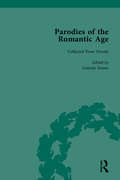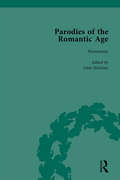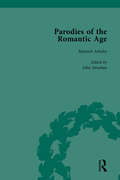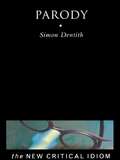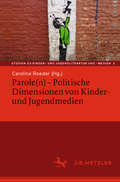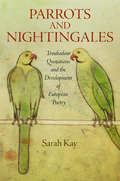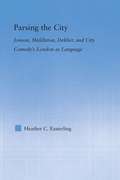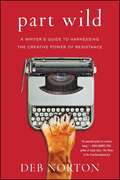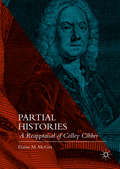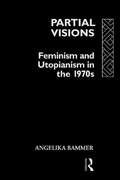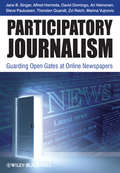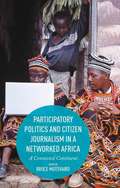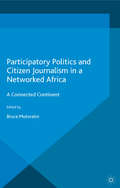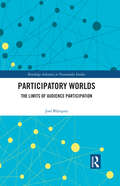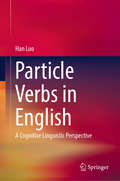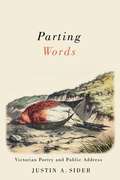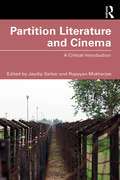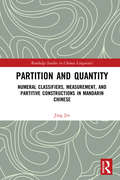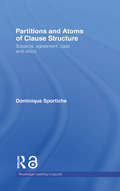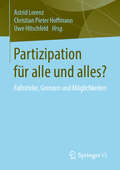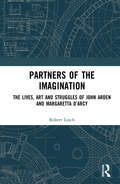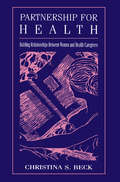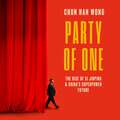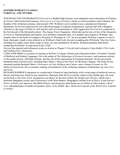- Table View
- List View
Parodies of the Romantic Age Vol 3: Poetry Of The Anti-jacobin And Other Parodic Writings
by John Strachan Graeme StonesThis volume collects together a wealth of material ranging from verse parodies originally published in pamphlet form, to longer works such as P.G. Patmore's parodies of the works of Byron, Lamb and Hazlitt.
Parodies of the Romantic Age Vol 4: Poetry Of The Anti-jacobin And Other Parodic Writings
by John Strachan Graeme StonesThis volume collects together a wealth of material ranging from verse parodies originally published in pamphlet form, to longer works such as P.G. Patmore's parodies of the works of Byron, Lamb and Hazlitt.
Parodies of the Romantic Age Vol 5: Poetry Of The Anti-jacobin And Other Parodic Writings
by John Strachan Graeme StonesThis volume collects together a wealth of material ranging from verse parodies originally published in pamphlet form, to longer works such as P.G. Patmore's parodies of the works of Byron, Lamb and Hazlitt.
Parody (The New Critical Idiom)
by Professor Simon DentithParody is part of all our lives. It occurs not only in literature, but also in everyday speech, in theatre and television, architecture and films. Drawing on examples from Aristophanes to The Simpsons, Simon Dentith explores:* the place of parody in the history of literature* parody as a subversive or conservative mode of writing* parody's pivotal role in debates about postmodernism* parody in the culture wars from ancient times to the presentThis lively introduction situates parody at the heart of literary and cultural studies and offers a remarkably clear guide to this sometimes complex topic. Parody will serve as an essential resource, to be read and re-read by students of all levels.
Parole (Studien zu Kinder- und Jugendliteratur und -medien #2)
by Caroline RoederAuch 50 Jahre nach 1968 sind die Kinder- und Jugendliteratur und -medien in vielfältiger Weise in politische und ideologische Horizonte eingespannt. Angesichts der aktuellen ‚Wiederkehr’ des Ideologischen und insbesondere nach dem kulturwissenschaftlichen Turn in den Geisteswissenschaften stellen sich die Fragen nach politischen und ideologischen Einschreibungen unter neuer Perspektive. Der Band versammelt 25 Beiträge, die das Feld historisch, kulturwissenschaftlich und systemtheoretisch vermessen. Dabei werden literaturästhetische Aspekte ebenso thematisiert wie pädagogische Diskurse oder interdisziplinäre Vernetzungen.
Parrots and Nightingales
by Sarah KayThe love songs of Occitan troubadours inspired a rich body of courtly lyric by poets working in neighboring languages. For Sarah Kay, these poets were nightingales, composing verse that is recognizable yet original. But troubadour poetry also circulated across Europe in a form that is less well known but was more transformative. Writers outside Occitania quoted troubadour songs word for word in their original language, then commented upon these excerpts as linguistic or poetic examples, as guides to conduct, and even as sources of theological insight. If troubadours and their poetic imitators were nightingales, these quotation artists were parrots, and their practices of excerption and repetition brought about changes in poetic subjectivity that would deeply affect the European canon.The first sustained study of the medieval tradition of troubadour quotation, Parrots and Nightingales examines texts produced along the arc of the northern Mediterranean--from Catalonia through southern France to northern Italy--through the thirteenth century and the first half of the fourteenth. Featuring extensive appendices of over a thousand troubadour passages that have been quoted or anthologized, Parrots and Nightingales traces how quotations influenced the works of grammarians, short story writers, biographers, encyclopedists, and not least, other poets including Dante and Petrarch. Kay explores the instability and fluidity of medieval textuality, revealing how the art of quotation affected the transmission of knowledge and transformed perceptions of desire from the "courtly love" of the Middle Ages to the more learned formulations that emerged in the Renaissance. Parrots and Nightingales deftly restores the medieval tradition of lyric quotation to visibility, persuasively arguing for its originality and influence as a literary strategy.
Parsing the City: Jonson, Middleton, Dekker, and City Comedy's London as Language (Literary Criticism and Cultural Theory)
by Heather EasterlingParsing the City updates our understanding of Jacobean city comedy’s discursive role in its London society. Working with three major plays by Ben Jonson and Thomas Middleton and Thomas Dekker, this book develops an updated reading of Jacobean city comedy as a dramatic subgenre whose engagement with early modern London was centrally linguistic and semiotic-- its plays staging and interrogating the city as a series of languages and language problems.
Part Wild: A Writer's Guide to Harnessing the Creative Power of Resistance
by Deb NortonWe all have the call to create. The question is…why don’t we answer it?We all come pre-loaded with a creative spark that drives us to innovate, explore, express, and make our unique contribution to the world. Often, though, that drive doesn’t get us very far down the road before it runs right smack into resistance—the mysterious force that thwarts creativity. But resistance needn’t be the enemy of writing—or any other creative endeavor. Deb Norton’s Part Wild provides fun and practical ways to turn resistance into a creative asset. Whether it presents as doubt, perfectionism, or Deb’s favorite: a chorus of withering inner critics, the power of resistance can be leveraged to launch the creative process with real momentum. Once we harness resistance, we can let our creative impulses off the leash. Norton has turned a decade of sold-out writing retreats and private coaching into a process for powering up your creative ideas. In Part Wild, she shares dozens of illuminating and effective practices and quick-start prompts that are guaranteed to get us out of our heads and onto the page. Just as The Artist’s Way gave millions of readers permission to explore their creative side, Part Wild shows writers of all levels of experience and skill how to harness the electrifying power of resistance and get writing.
Partial Histories
by Elaine M. McgirrThis book explores the multiple portrayals of the actor and theatre manager Colley Cibber, king of the dunces, professional fop, defacer ofShakespeare and the cruel and unforgiving father of Charlotte Charke. Butthese portraits of Cibber are doubly partial, exposing even as they paper overgaps and biases in the archive while reflecting back modern desires andmethodologies. The Colley Cibber 'everybody knows' has been variouslyconstructed through the rise of English literature as both a culturalenterprise and an academic discipline, a process which made Shakespeare the'nation's poet' and canonised Cibber's enemies Pope and Fielding; theatrehistory's narrative of the birth of naturalism; and the reclamation andcelebration of Charlotte Charke by women's literary history. Each of thesestories requires a Colley Cibber to be its butt, antithesis, and/or bête noir. Thismonograph challenges these partial histories and returns the theatre manager,playwright, poet laureate and bon viveur to the centre of eighteenth-centuryculture and cultural studies.
Partial Visions: Feminism And Utopianism In The 1970s (Ralahine Utopian Studies #16)
by Angelika BammerPositing that a radical utopianism is one of the most vital impulses of feminist politics, Partial Visions traces the articulation of this impulse in the work of Euro-American, French and German women writers of the 1970s. It argues that this feminist utopianism both continued and reconceptualized a critical dimension of Left politics, yet concludes that feminist utopianism is not just visionary, but myopic - time and culture bound - as well.
Participatory Journalism: Guarding Open Gates at Online Newspapers
by Jane B. Singer David Domingo Ari Heinonen Steve Paulussen Thorsten Quandt Zvi Reich Marina Vujnovic Alfred HermidaWho makes the news in a digital age? Participatory Journalism offers fascinating insights into how journalists in Western democracies are thinking about, and dealing with, the inclusion of content produced and published by the public. A timely look at digital news, the changes it is bringing for journalists and an industry in crisis Original data throughout, in the form of in-depth interviews with dozens of journalists at leading news organizations in ten Western democracies Provides a unique model of the news-making process and its openness to user participation in five stages Gives a first-hand look at the workings and challenges of online journalism on a global scale, through data that has been seamlessly combined so that each chapter presents the views of journalists in many nations, highlighting both similarities and differences, both national and individual
Participatory Politics and Citizen Journalism in a Networked Africa: A Connected Continent
by Bruce MutsvairoThis book investigates the role of citizen journalism in railroading social and political changes in sub-Saharan Africa. Case studies are drawn from research conducted by leading scholars from the fields of media studies, journalism, anthropology and history, who uniquely probe the real impact of technologies in driving change in Africa.
Participatory Politics and Citizen Journalism in a Networked Africa: A Connected Continent
by Bruce MutsvairoThis book investigates the role of citizen journalism in railroading social and political changes in sub-Saharan Africa. Case studies are drawn from research conducted by leading scholars from the fields of media studies, journalism, anthropology and history, who uniquely probe the real impact of technologies in driving change in Africa.
Participatory Worlds: The limits of audience participation (Routledge Advances in Transmedia Studies)
by José BlázquezThis book is an in-depth analysis of participatory worlds, practices beyond the mainstream models of content production and IP management that allow audience members to contribute canonically to the expansion of storyworlds, blurring the line between the traditional roles of consumers and producers. Shifting discussions of participatory culture and cross-media production and consumption practices to more independent media contexts, the book explores the limits, borders and boundaries of participating in today’s digital media storyworlds. The text examines how audience participation works, identifying opportunities to make it a meaningful practice for audiences and an asset for IP owners, and discussing the challenges and barriers that the application of participatory culture brings along. The book defines what meaningful participation is by introducing the concept of ‘intervention’ and explains a range of factors impacting the way in which participatory worlds and relationships between producers, audiences and the world are shaped. This volume will be of great relevance to media practitioners, scholars and students interested in transmedia storytelling, fandom, literary studies and comparative literature, new media and digital culture, gaming and media studies.
Particle Verbs in English: A Cognitive Linguistic Perspective
by Han LuoThis book explains why cognitive linguistics offers a plausible theoretical framework for a systematic and unified analysis of the syntax and semantics of particle verbs. It explores the meaning of the verb + particle syntax, the particle placement of transitive particle verbs, how particle placement is related to idiomaticity, and the relationship between idiomaticity and semantic extension. It also offers valuable linguistic implications for future studies on complex linguistic constructions using a cognitive linguistic approach, as well as insightful practical implications for the learning and teaching of English particle verbs.
Parting Words: Victorian Poetry and Public Address (Victorian Literature and Culture Series)
by Justin A. SiderValedictory addresses offer a way to conceptualize the relation of self to others, private to public, ephemeral to eternal. Whether deathbed pronouncements, political capitulations, or seafaring farewells, "parting words" played a crucial role in the social imagination of Victorian writing. In this compelling new book, Justin Sider traces these public addresses across a wide range of works, from poems by Byron, Tennyson, and Browning, to essays by Twain and Wilde, to novels by Dickens and Eliot.Ironically, while the Victorian era saw the loss of faith in a unitary national public, it asked poetry to address just such a public. Attending to the form, rather than the discursive content, of poets' engagement with public culture, Parting Words explains how the valedictory allowed Victorian poets to explore the ways their poems might be received by distant and anonymous readers in an emergent mass culture. Using a wide array of materials such as letters and reviews to describe the rapidly changing print culture in which poets were intervening, Sider shows how the growing diversification and destabilization of the Victorian reading public was countered by the demand for a public poetry. Characteristically, the speakers of Tennyson's "Ulysses" and Matthew Arnold's "Empedocles on Etna" imagine their farewells as simultaneous entrances into a public space where they and their readers, however distant, might yet meet. This new consciousness anticipated modernist poetry, which in turn used the valedictory to underscore the futility and alienation of such hopes.
Partition Literature and Cinema: A Critical Introduction
by Jaydip SarkarThis book studies literary and cinematic representations of the Partition of India. It discusses Partition as not just an immediate historical catastrophe but as a lingering cultural presence and consequently a potent trope in literary and visual representations. The volume features essays on key texts – written and visual – including Train to Pakistan, "Toba Tek Singh", Basti, Garm Hava, Pinjar, among others. Partition Literature and Cinema will be indispensable introductory reading for students and researchers of modern Indian history, Partition studies, literature, film studies, media and cultural studies, popular culture and performance, postcolonial studies, and South Asian studies. It will also be of interest to enthusiasts of Indian cinematic history.
Partition and Quantity: Numeral Classifiers, Measurement, and Partitive Constructions in Mandarin Chinese (Routledge Studies in Chinese Linguistics)
by Jing JinPartition and Quantity: Numeral Classifiers, Measurement, and Partitive Constructions in Mandarin Chinese presents an in-depth investigation into the semantic and syntactic properties of Chinese classifiers and conducts a comprehensive examination on the use of different quantity constructions in Chinese. This book echoes a rapid development in the past decades in Chinese linguistics research within the generative framework on Chinese classifier phrases, an area that has emerged as one of the most cutting-edge themes in the field of Chinese linguistics. The book on the one hand offers a closer scrutiny on empirical data and revisits some long-lasting research problems, such as the semantic factor bearing on the formation of Chinese numeral classifier constructions, the (non-)licensing of the linker de (的) in between the numeral classifier and the noun, and the conditions regulating the use of pre-classifier adjectives. On the other hand, particular attention is paid to the issues that have been less studied or gone unnoticed in previous studies, including a (more) fine-grained subcategorization of Chinese measurement constructions, the multiple grammatical roles played by the marker de (的) in different numeral classifier constructions, the formation and derivation of Chinese partitive constructions, etc.
Partitions and Atoms of Clause Structure: Subjects, Agreement, Case and Clitics (Routledge Leading Linguists)
by Dominique SporticheThis collection brings together some of Dominique Sportiche's best work, including essays that are published here for the first time. The articles discuss the architecture of syntax in natural languages and Sportiche suggests that languages do not differ at all in their syntactic organization. This view takes shape through the analysis of a variety of syntactic configurations and essays examine what it means to be a Subject, how Case marking functions, how it relates to Agreement, and how Pronominal Clitic Constructions should be analyzed.
Partizipation für alle und alles?: Fallstricke, Grenzen und Möglichkeiten
by Astrid Lorenz Uwe Hitschfeld Christian Pieter HoffmannBasierend auf einer Darstellung herausfordernder Projekte, diskutiert der Band Grenzen der politischen Partizipation in Deutschland und identifiziert Erfolgsfaktoren. Zunächst rücken ausgewählte Projekte in das Blickfeld, bei denen Bemühungen um mehr Partizipation nicht immer zum gewünschten Ergebnis führten. Grenzen der Beteiligung im politischen System der Bundesrepublik Deutschland werden systematisch analysiert. Vor diesem Hintergrund arbeiten mehrere Beiträge schließlich Erfolgsfaktoren für Partizipation heraus. So entsteht ein fundiertes Bild von Beteiligung als kommunikatives Verfahren der Integration und kollektiven Entscheidungsfindung aus Sicht von Wissenschaft und Praxis.
Partners of the Imagination: The Lives, Art and Struggles of John Arden and Margaretta D’Arcy
by Robert LeachPartners of the Imagination is the first in-depth study of the work of John Arden and Margaretta D’Arcy, partners in writing and cultural and political campaigns. Beginning in the 1950s, Arden and D’Arcy created a series of hugely admired plays performed at Britain’s major theatres. Political activists, they worked tirelessly in the peace movement and the Northern Ireland ‘Troubles’, during which D’Arcy was gaoled. She is also a veteran of the Greenham Common Women’s Peace camp. Their later work included Booker-listed novels, prize-winning stories, essays and radio plays, and D’Arcy founded and ran a Woman’s Pirate Radio station. Raymond Williams described Arden as ‘the most genuinely innovative’ of the playwrights of his generation, and Chambers and Prior claimed that ‘The Non-Stop Connolly Show’, D’Arcy and Arden’s six-play epic, ‘has fair claim to being one of the finest pieces of post-war drama in the English language’. This study explores the connections between art and life, and between the responsibilities of the writer and the citizen. Importantly, it also evaluates the range of literary works (plays, poetry, novels, essays, polemics) created by these writers, both as literature and drama, and as controversialist activity in its own right. This work is a landmark examination of two hugely respected radical writers.
Partnership for Health: Building Relationships Between Women and Health Caregivers (Routledge Communication Series)
by Christina S. Beck Sandra L. Ragan Athena du Pr‚ Athena du PreIn the 1960s, feminists voiced their outrage about the health care system in the United States which routinely discriminated against women and, in so doing, literally jeopardized their health and well-being. Over a decade later, women's health advocates still stressed the need for reform of this male-dominated institution because of the on-going threat to the health of American women. In the 1990s, nearly 40 years after women began their fight for quality and equitable treatment from the medical profession, women unfortunately continue to confront problems on numerous levels including discrimination in medical research and in the availability of insurance and health care providers. Most alarming, however, is the fact that women today--like women in the '60s and before--lack information, understanding, and adequate diagnoses and treatment from their health caregivers. This book extends from a program of research on women's health issues by the authors. More than 150 audio-taped, naturally occurring interactions between health caregivers and their female patients from three different health care settings--as well as ethnographic field notes in three additional settings which provide health care to women-- constitute the data for this investigation. They explore the consequentiality of relational issues during women's health care encounters and examine how health care participants save face, enact roles, co-construct their encounters, and accomplish the objective of education and medical care. Unlike earlier works, this study utilizes an extensive data collection derived directly from hundreds of interactions between health care providers and their patients, as opposed to surveys or case studies of singular practitioners. The authors examine the data in light of insights from a variety of theoretical perspectives and are committed to exploring the implication that medical encounters are collaboratively managed by both patients and caregivers. Given these theoretical and empirical contributions, the authors believe this book will advance present understanding in the areas of health and relational communication, women's health care, gender issues in communication, conversation analysis, discourse processes, and institutional talk.
Party of One: The Rise of Xi Jinping and China's Superpower Future
by Chun Han WongFrom one of the most admired reporters covering China today, a vital new account of the life and political vision of Xi Jinping, the authoritarian leader of the People's Republic whose hard-edged tactics have set the rising superpower on a collision with Western liberal democracies.Party of One: The Rise of Xi Jinping and China's Superpower Future shatters the many myths and caricatures that shroud one of the world's most secretive political organizations and its leader. Many observers misread Xi during his early years in power, projecting their own hopes that he would steer China toward more political openness, rule of law, and pro-market economics. Having masked his beliefs while climbing the party hierarchy, Xi has centralized decision-making powers, encouraged a personality cult around himself, and moved toward indefinite rule by scrapping presidential term limits-stirring fears of a return to Mao-style dictatorship. Today, the party of Xi favors political zeal over technical expertise, trumpets its faith in Marxism, and proclaims its reach into every corner of Chinese society with Xi portraits and hammer-and-sickle logos. Under Xi, China has challenged Western preeminence in global affairs and cast its authoritarian system as a model of governance worthy of international emulation.As a China reporter for the Wall Street Journal, Chun Han Wong has chronicled Xi's hardline strategy for crushing dissent and his political repression in Hong Kong and Xinjiang. Wong spent five years in Beijing before the Chinese government forced him to leave mainland China in 2019, after which he moved to Hong Kong and continued writing about Xi's leadership. Now, Wong has drawn on his years of first-hand reporting across China to create a lucid and historically-rooted account of China's leader, and how he inspires fear and fervor in his party, his nation, and beyond.Timely, revelatory, and important, Party of One explains how the future Xi imagines for China will reshape the future of the entire world.
Parva: A Tale of War, Peace, Love, Death, God and Man
by S. L. Bhyrappan K. Raghavendra RaoParva is a terrific insight into Mahabharatha. It takes the godly halo from the characters and presents them as human beings with needs as natural as all of us have. The question is whether the characters are still worshipable.
Parzival and Titurel (Oxford World's Classics Series)
by Richard Barber Cyril Edwards Wolfram Von EschenbachWritten in the first decade of the thirteenth century, Parzival is the greatest of the medieval Grail romances. It tells of Parzival's growth from youthful folly to knighthood at the court of King Arthur, and of his quest for the Holy Grail. Exuberant and gothic in its telling, and profoundly moving, Parzival has inspired and influenced works as diverse as Wagner's Parsifal and Lohengrin, Terry Gilliam's film The Fisher King, and Umberto Eco's Bandolino. <p><p>This fine translation, the first English version for over 25 years, conveys the power of this complex, wide-ranging medieval masterpiece. The introduction places Eschenbach's work in the wider context of the development of the Arthurian romance and of the Grail legend. This edition also includes an index to proper names and a genealogical table, and is the first to combine Parzival with the fragments of Titurel.
